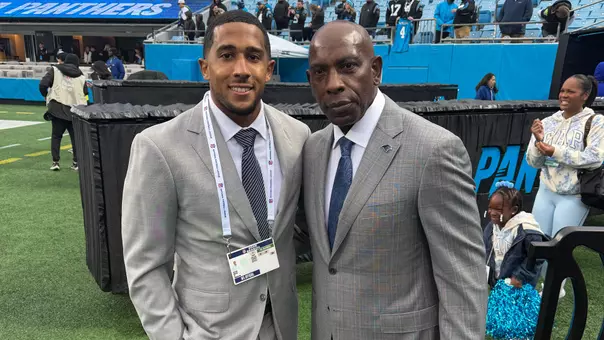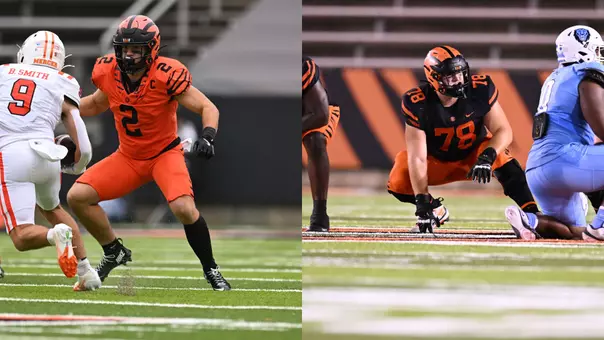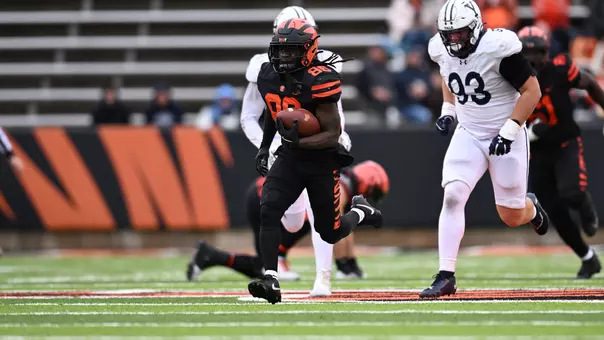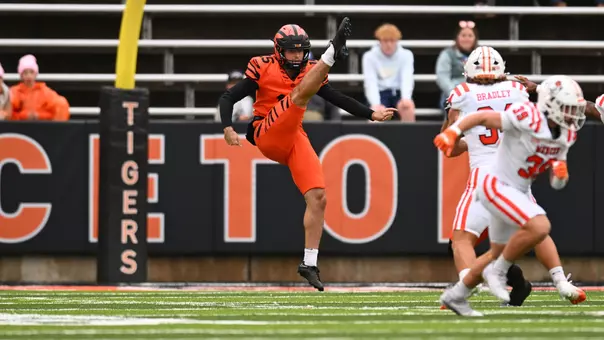Princeton University Athletics
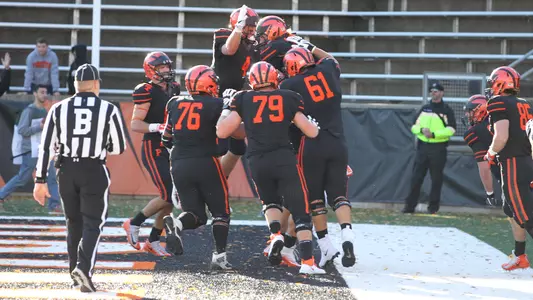
John Lovett celebrates the game-winning touchdown vs. Dartmouth in 2018.
Top 15 Wins of the Bob Surace Era: Part 5
November 21, 2025 | Football
By Craig Sachson
PrincetonTigersFootball.com
Bob Surace '90 returned to his alma mater with a mandate — from the administration, from alumni, and from himself — to restore Princeton football to the top tier of the Ivy League.
The first two seasons left Tiger fans wondering if that hope was nothing more than an impossible dream.
The 12 years since? They've delivered a run unlike anything Princeton had experienced in generations.
Now in his 15th season as head coach, Surace is tied with Hall of Famer Dick Colman for the most Ivy League titles in program history (four). His 84 victories leave him just five shy of the program record held by Hall of Famer Bill Roper.
Throughout this season, we'll celebrate this era by revisiting the 15 most impactful wins from Surace's tenure. Every two weeks, three games will be highlighted until we count down to the top three, revealed in the final week of the season.
First Series: Games 13-15
Second Series: Games 10-12
Third Series: Games 7-9
Fourth Series: Games 4-6
#3 - #17 Princeton 18, #16 Harvard 16 (5 OT) • Oct. 23, 2021
The Setting: Princeton was in the middle a historic stretch of football, although that stretch included a world-altering global pandemic. The Tigers went 18-2 between 2018 and 2019, then watched the world shut down due to COVID. While college football did return in the fall of 2020, the Ivy League stayed on the sideline that season. Many Princeton players put off graduation for a year and trained in whatever way they could to try for one more championship push. Through the first five games of the 2021 season, the Tigers averaged more than 41 points per game and knocked off a nationally ranked Monmouth team on the road. The first obstacle came in an undefeated showdown between #17 Princeton and #16 Harvard on Powers Field. How did it go? Princeton didn't score an offensive touchdown the entire game, nor did it score in three straight overtimes. Sounds bad, right?
Sounds memorable.
The Story: If you just take this game to the start of the third overtime, it's pretty wild. Princeton, which outgained Harvard 257-234 for the game, scored its only touchdown when future captain Liam Johnson blocked a punt and teammate Cash Goodhart recovered it in the end zone for a third-quarter touchdown that opened a 13-6 lead. Harvard had one second-half drive that went more than 17 yards, but they made that one count with a game-tying score early in the fourth quarter. Princeton kicker Jeffrey Sexton missed a go-ahead 37-yard field goal later in the fourth, but he bounced back by hitting a must-make 37-yarder while trailing 16-13 in the first overtime. A scoreless second overtime set up a format where both teams got one chance to try a two-point conversion to score, and Princeton missed on its third-overtime attempt. Harvard looked like it won the game on the next play, but a timeout by Bob Surace right before the snap negated the score. Princeton stopped them on the third and fourth OT tries, and it grabbed a lead on a connection between quarterback Cole Smith and Jacob Birmelin in the fifth. Trevor Forbes knocked away Harvard's final attempt, setting off a wild scene of both celebration and relief for a team that would win another Ivy League title four weeks later.
The Significance: Neither this game nor the next one clinched Ivy League championships, but they were THE memorable game of both seasons. This game was wild in so many ways, especially with the swings of emotion through the overtime sessions; by the end of the fifth session, it was hard to remember the Sexton field goal to force the second OT, much less the blocked punt that gave Princeton its only touchdown. But it was also such a meaningful win for the program considering all that the players went through during the pandemic. Princeton football had won Ivy League titles in 2013, 2016 and 2018, and the current players knew they had the potential to grab a fourth title, even if they didn't truly know if there would be another football season. The COVID pandemic forced the Tiger players to trust in each other, to connect from remote settings, and to train in creative manners. On this day, against a strong Harvard program, they needed every bit of that trust and effort to clinch a win and maintain its course towards an Ivy League title.
There is one other connection between Games #3 and #2 on this list. Smith, the winning quarterback and eventual Ivy League champion, came to Princeton from Christian Academy of Knoxville. He put up historic numbers there, matching those of a fellow Christian Academy quarterback from years earlier. That quarterback, who would later speak with Smith to share the value of the Princeton experience, was Quinn Epperly.
#2 - Princeton 51, #23 Harvard 48 (3 OT) • Oct. 26, 2013
The Setting: Princeton and Harvard, coming off their remarkable 2012 showdown, met in Cambridge with matching 2-0 Ivy League records and the two top-ranked offenses in the Ivy League. It had been six years since Princeton had beaten a Top-25 team, and eight years since Princeton had won at Harvard. Princeton ranked third among FCS offenses with 42.4 points per game and looked like a true title contender. While Ivy League fans may have appreciated Princeton's performance one year earlier against the Crimson, many people weren't convinced they were in that class yet. Going on the road and beating a nationally ranked Harvard team would change some minds. Doing so in heart-stopping fashion, and then ending with the SAME connection from the 2012 masterpiece … that made it one for the ages.
The Story: This game was as action-packed as any over the last 15 years (970 total yards combined!), and it took three overtimes to decide a winner. Princeton controlled play early, grabbing a first-quarter advantage with a pair of touchdowns, and it held three different leads later in regulation, but Harvard kept coming back. The Crimson got in range for a game-winning field goal in the final minute with a 45-yard pass, but a 50-yard attempt at the final whistle missed left. Harvard led in both the first and third overtimes, but Roman Wilson answered each time. He rushed for a 9-yard score in the first session to even the score at 42-42, and then he repeated his magical connection with Quinn Epperly on a second-and-goal from the 6 to clinch the 51-48 win in triple overtime; this time, Wilson tip-toed inside the right sideline to set off a wild celebration on the Princeton sideline.
This game was a thrill ride the whole way. The teams combined for 970 yards and 13 touchdowns. Every overtime session ended in points, meaning there were three rallies in extra time alone. The last one, as announcer Dan Loney was, "Epperly. To Wilson. Again!".
The Significance: Why does this game rank so high, topping a handful of games that actually clinched an Ivy League title? What puts this game ahead of two other wild wins over Harvard, the crazy 2012 comeback or the 5-OT marathon in 2021? Princeton had not won an Ivy League title in seven years, and that 2012 win over the Crimson felt like the Tigers caught lightning in a bottle. There was nothing magical about this game; if anything, Harvard caught the biggest break of the game when a fourth-down bomb bounced off a Princeton defender and ended as a Crimson touchdown. This had all the makings of another road heartbreaker; Princeton wouldn't let it happen. The Tigers didn't allow a scoring drive of more than 25 yards in the fourth quarter or overtime, and it made gutsy plays on both sides of the ball when it mattered most.
And then there was the performance of Epperly. Five years later, players like Chad Kanoff and John Lovett would rewrite the record book, but it's hard to imagine anybody playing a better single game in a bigger moment than this one. The eventual Ivy League Offensive Player of the Year completed 37 of 50 passes for 321 yards, six touchdowns and no interceptions (absurd), and he rushed 19 times for 86 yards. His final pass had little margin for error, but Epperly didn't need it.
In 2012, you could make the case that Princeton shouldn't have beaten Harvard, but it did. In 2013, Princeton should have beaten Harvard. It did, and it won an Ivy League title one month later.
#1 - #14 Princeton 14, #20 Dartmouth 9 • Nov. 3, 2018
The Setting: This is more than just the biggest win of the Bob Surace Era. Until dethroned, this is the Ivy League's biggest game of the century.
Princeton and Dartmouth BOTH came into the game undefeated and ranked inside the FCS Top 20. Neither team would lose a game before or after this weekend, and both would end the season ranked inside the Top 20; the last time two Ivy League teams finished the same season ranked inside the Top 20 was 1950. Princeton hadn't won an outright Ivy League title since 1995, and it hadn't completed a perfect Ivy League season since 1964. Both possibilities were still on the table.
Both teams had earned a relatively close win over Harvard over the two previous weeks, but they basically ran roughshod over everybody else. Princeton led the nation in scoring offense and total offense, and either Princeton or Dartmouth led the Ivy League in every major defensive category. The head coaches were the only two men in league history to have won Ivy titles as both a player and head coach (Bob Surace and Dartmouth's Buddy Teevens). There are big Ivy League games every year. This FELT different than just a big game. And it played out that way.
The Story: This Top 15 has been filled with memorable touchdowns and overtime thrillers. There have been dramatic comebacks and record-breaking perforrmances. This was a game of physicality and will, befitting two of arguably the 10 best Ivy League teams of the last 25 years. Neither team came close to matching its offensive averages, but when Princeton trailed midway through the fourth quarter, the Tigers found a way. Dartmouth had led 9-7 since a safety early in the second quarter, and it had stopped the Tigers on fourth-and-short early in the fourth quarter. The Princeton defense got the biggest 3-and-out of the season, and All-America quarterback John Lovett hit a 10-yard pass to fellow All-America Jesper Horsted before scoring the go-ahead touchdown from five yards out with 6:33 to go.
Dartmouth would have two more tries with the ball, and the Big Green would travel a total of four yards over those two series combined. In fact, from the midway point of the third quarter, Dartmouth would have four offensive series and move the ball a total of four yards. A Mike Wagner sack and a Jeremiah Tyler tackle for loss would be the key plays on Princeton's final two defensive stands, and a game-sealing first down rush by Ryan Quigley clinched the Tigers' biggest victory in Princeton Stadium history.
The Significance: Where to begin? When considering games and rankings for this series, all thought started at Game #2. There was never any question that this was #1. It's the best game for all the reasons listed above, and for what was to come over the next two weeks, and for the tension and electricity inside Princeton Stadium that afternoon. It had been more than 50 years since a Tiger team produced perfection. Several championship teams finished with 1- or 2-loss seasons, but the 2018 Tigers were equal parts talented and driven. They were loaded with standouts on both sides of the ball, and the leadership from the likes of Lovett and Kurt Holuba never allowed the team to settle for anything less than maximum effort. This was the exact type of opponent that Princeton team needed to fully validate its greatness. Dartmouth was also talented and hungry, and it was the one team that never backed down against Princeton that season. Everything didn't go right for either side, which is the way it is supposed to be between great teams.
It was the proverbial heavyweight battle, and the home team had a bit more in the tank at the end.
It was more than just the biggest win of the Bob Surace Era.
It was the perfect win.
PrincetonTigersFootball.com
Bob Surace '90 returned to his alma mater with a mandate — from the administration, from alumni, and from himself — to restore Princeton football to the top tier of the Ivy League.
The first two seasons left Tiger fans wondering if that hope was nothing more than an impossible dream.
The 12 years since? They've delivered a run unlike anything Princeton had experienced in generations.
Now in his 15th season as head coach, Surace is tied with Hall of Famer Dick Colman for the most Ivy League titles in program history (four). His 84 victories leave him just five shy of the program record held by Hall of Famer Bill Roper.
Throughout this season, we'll celebrate this era by revisiting the 15 most impactful wins from Surace's tenure. Every two weeks, three games will be highlighted until we count down to the top three, revealed in the final week of the season.
First Series: Games 13-15
Second Series: Games 10-12
Third Series: Games 7-9
Fourth Series: Games 4-6
#3 - #17 Princeton 18, #16 Harvard 16 (5 OT) • Oct. 23, 2021
The Setting: Princeton was in the middle a historic stretch of football, although that stretch included a world-altering global pandemic. The Tigers went 18-2 between 2018 and 2019, then watched the world shut down due to COVID. While college football did return in the fall of 2020, the Ivy League stayed on the sideline that season. Many Princeton players put off graduation for a year and trained in whatever way they could to try for one more championship push. Through the first five games of the 2021 season, the Tigers averaged more than 41 points per game and knocked off a nationally ranked Monmouth team on the road. The first obstacle came in an undefeated showdown between #17 Princeton and #16 Harvard on Powers Field. How did it go? Princeton didn't score an offensive touchdown the entire game, nor did it score in three straight overtimes. Sounds bad, right?
Sounds memorable.
The Story: If you just take this game to the start of the third overtime, it's pretty wild. Princeton, which outgained Harvard 257-234 for the game, scored its only touchdown when future captain Liam Johnson blocked a punt and teammate Cash Goodhart recovered it in the end zone for a third-quarter touchdown that opened a 13-6 lead. Harvard had one second-half drive that went more than 17 yards, but they made that one count with a game-tying score early in the fourth quarter. Princeton kicker Jeffrey Sexton missed a go-ahead 37-yard field goal later in the fourth, but he bounced back by hitting a must-make 37-yarder while trailing 16-13 in the first overtime. A scoreless second overtime set up a format where both teams got one chance to try a two-point conversion to score, and Princeton missed on its third-overtime attempt. Harvard looked like it won the game on the next play, but a timeout by Bob Surace right before the snap negated the score. Princeton stopped them on the third and fourth OT tries, and it grabbed a lead on a connection between quarterback Cole Smith and Jacob Birmelin in the fifth. Trevor Forbes knocked away Harvard's final attempt, setting off a wild scene of both celebration and relief for a team that would win another Ivy League title four weeks later.
The Significance: Neither this game nor the next one clinched Ivy League championships, but they were THE memorable game of both seasons. This game was wild in so many ways, especially with the swings of emotion through the overtime sessions; by the end of the fifth session, it was hard to remember the Sexton field goal to force the second OT, much less the blocked punt that gave Princeton its only touchdown. But it was also such a meaningful win for the program considering all that the players went through during the pandemic. Princeton football had won Ivy League titles in 2013, 2016 and 2018, and the current players knew they had the potential to grab a fourth title, even if they didn't truly know if there would be another football season. The COVID pandemic forced the Tiger players to trust in each other, to connect from remote settings, and to train in creative manners. On this day, against a strong Harvard program, they needed every bit of that trust and effort to clinch a win and maintain its course towards an Ivy League title.
There is one other connection between Games #3 and #2 on this list. Smith, the winning quarterback and eventual Ivy League champion, came to Princeton from Christian Academy of Knoxville. He put up historic numbers there, matching those of a fellow Christian Academy quarterback from years earlier. That quarterback, who would later speak with Smith to share the value of the Princeton experience, was Quinn Epperly.
#2 - Princeton 51, #23 Harvard 48 (3 OT) • Oct. 26, 2013
The Setting: Princeton and Harvard, coming off their remarkable 2012 showdown, met in Cambridge with matching 2-0 Ivy League records and the two top-ranked offenses in the Ivy League. It had been six years since Princeton had beaten a Top-25 team, and eight years since Princeton had won at Harvard. Princeton ranked third among FCS offenses with 42.4 points per game and looked like a true title contender. While Ivy League fans may have appreciated Princeton's performance one year earlier against the Crimson, many people weren't convinced they were in that class yet. Going on the road and beating a nationally ranked Harvard team would change some minds. Doing so in heart-stopping fashion, and then ending with the SAME connection from the 2012 masterpiece … that made it one for the ages.
The Story: This game was as action-packed as any over the last 15 years (970 total yards combined!), and it took three overtimes to decide a winner. Princeton controlled play early, grabbing a first-quarter advantage with a pair of touchdowns, and it held three different leads later in regulation, but Harvard kept coming back. The Crimson got in range for a game-winning field goal in the final minute with a 45-yard pass, but a 50-yard attempt at the final whistle missed left. Harvard led in both the first and third overtimes, but Roman Wilson answered each time. He rushed for a 9-yard score in the first session to even the score at 42-42, and then he repeated his magical connection with Quinn Epperly on a second-and-goal from the 6 to clinch the 51-48 win in triple overtime; this time, Wilson tip-toed inside the right sideline to set off a wild celebration on the Princeton sideline.
This game was a thrill ride the whole way. The teams combined for 970 yards and 13 touchdowns. Every overtime session ended in points, meaning there were three rallies in extra time alone. The last one, as announcer Dan Loney was, "Epperly. To Wilson. Again!".
The Significance: Why does this game rank so high, topping a handful of games that actually clinched an Ivy League title? What puts this game ahead of two other wild wins over Harvard, the crazy 2012 comeback or the 5-OT marathon in 2021? Princeton had not won an Ivy League title in seven years, and that 2012 win over the Crimson felt like the Tigers caught lightning in a bottle. There was nothing magical about this game; if anything, Harvard caught the biggest break of the game when a fourth-down bomb bounced off a Princeton defender and ended as a Crimson touchdown. This had all the makings of another road heartbreaker; Princeton wouldn't let it happen. The Tigers didn't allow a scoring drive of more than 25 yards in the fourth quarter or overtime, and it made gutsy plays on both sides of the ball when it mattered most.
And then there was the performance of Epperly. Five years later, players like Chad Kanoff and John Lovett would rewrite the record book, but it's hard to imagine anybody playing a better single game in a bigger moment than this one. The eventual Ivy League Offensive Player of the Year completed 37 of 50 passes for 321 yards, six touchdowns and no interceptions (absurd), and he rushed 19 times for 86 yards. His final pass had little margin for error, but Epperly didn't need it.
In 2012, you could make the case that Princeton shouldn't have beaten Harvard, but it did. In 2013, Princeton should have beaten Harvard. It did, and it won an Ivy League title one month later.
#1 - #14 Princeton 14, #20 Dartmouth 9 • Nov. 3, 2018
The Setting: This is more than just the biggest win of the Bob Surace Era. Until dethroned, this is the Ivy League's biggest game of the century.
Princeton and Dartmouth BOTH came into the game undefeated and ranked inside the FCS Top 20. Neither team would lose a game before or after this weekend, and both would end the season ranked inside the Top 20; the last time two Ivy League teams finished the same season ranked inside the Top 20 was 1950. Princeton hadn't won an outright Ivy League title since 1995, and it hadn't completed a perfect Ivy League season since 1964. Both possibilities were still on the table.
Both teams had earned a relatively close win over Harvard over the two previous weeks, but they basically ran roughshod over everybody else. Princeton led the nation in scoring offense and total offense, and either Princeton or Dartmouth led the Ivy League in every major defensive category. The head coaches were the only two men in league history to have won Ivy titles as both a player and head coach (Bob Surace and Dartmouth's Buddy Teevens). There are big Ivy League games every year. This FELT different than just a big game. And it played out that way.
The Story: This Top 15 has been filled with memorable touchdowns and overtime thrillers. There have been dramatic comebacks and record-breaking perforrmances. This was a game of physicality and will, befitting two of arguably the 10 best Ivy League teams of the last 25 years. Neither team came close to matching its offensive averages, but when Princeton trailed midway through the fourth quarter, the Tigers found a way. Dartmouth had led 9-7 since a safety early in the second quarter, and it had stopped the Tigers on fourth-and-short early in the fourth quarter. The Princeton defense got the biggest 3-and-out of the season, and All-America quarterback John Lovett hit a 10-yard pass to fellow All-America Jesper Horsted before scoring the go-ahead touchdown from five yards out with 6:33 to go.
Dartmouth would have two more tries with the ball, and the Big Green would travel a total of four yards over those two series combined. In fact, from the midway point of the third quarter, Dartmouth would have four offensive series and move the ball a total of four yards. A Mike Wagner sack and a Jeremiah Tyler tackle for loss would be the key plays on Princeton's final two defensive stands, and a game-sealing first down rush by Ryan Quigley clinched the Tigers' biggest victory in Princeton Stadium history.
The Significance: Where to begin? When considering games and rankings for this series, all thought started at Game #2. There was never any question that this was #1. It's the best game for all the reasons listed above, and for what was to come over the next two weeks, and for the tension and electricity inside Princeton Stadium that afternoon. It had been more than 50 years since a Tiger team produced perfection. Several championship teams finished with 1- or 2-loss seasons, but the 2018 Tigers were equal parts talented and driven. They were loaded with standouts on both sides of the ball, and the leadership from the likes of Lovett and Kurt Holuba never allowed the team to settle for anything less than maximum effort. This was the exact type of opponent that Princeton team needed to fully validate its greatness. Dartmouth was also talented and hungry, and it was the one team that never backed down against Princeton that season. Everything didn't go right for either side, which is the way it is supposed to be between great teams.
It was the proverbial heavyweight battle, and the home team had a bit more in the tank at the end.
It was more than just the biggest win of the Bob Surace Era.
It was the perfect win.
Players Mentioned
Trench Talk - Episode 5: Jaden Wedderburn
Thursday, November 20
Beyond the Stripes: Torian Roberts
Wednesday, November 19
Trench Talk - Episode 4: London Robinson
Tuesday, October 28
Trench Talk - Episode 3: Joe Harris
Thursday, October 16



.png&width=24&type=webp)


